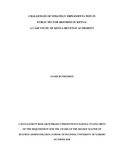| dc.description.abstract | Strategy implementation has been a challenge for many organizations and scholars in the field of management have debated these challenges for many years. This debate has gained momentum over the recent past with the introduction of new public management where public sector organizations take on market-type reforms. The Kenya Revenue Authority initiated market type reforms called the Revenue Administration Reform and Modernization Program (RARMP) which commenced in 2004/05 with the objective of transforming KRA into a modem, fully integrated and client-focused organization. The present study focused on public sector reforms in KRA but from a new public management (NPM) perspective.
The study sought to determine the types of public management reforms, the effects of public management reforms, and the challenges of implementing public management reforms.
A.qualitative research design was used in this study. Primary data was collected using structured interview guides with the managers of KRA. Content analysis was used to perform data analysis where the interview responses were structured based on various themes as espoused by objectives of the study. Secondary data were also used to corroborate the results of the interviews by looking at the documents for the reforms and modernization programs.
The study found that the reforms included automating processes, integration of systems, business process re-engineering and enhancement of tax-payer services. The reforms had led to improved revenue collection and decrease in cost of revenue collection. It was noted that there were several challenges that the reforms had to go through from funding to resistance. The study concludes that the Kenya Revenue Authority adopted the management instruments used in the private sector (New Public Management) and used the same tools to address the challenges it was facing. The reforms had improved the revenue collection of the authority and employee productivity.
It is recommended that public sector organizations seeking to implement change process or any other reforms should emulate the process utilized by KRA if the reforms are to be successful. The study recommends need for firms undergoing change process to communicate more and sensitize all stakeholders about the aims of reforms so as to reduce resistance from both internal and external stakeholders. | en_US |

